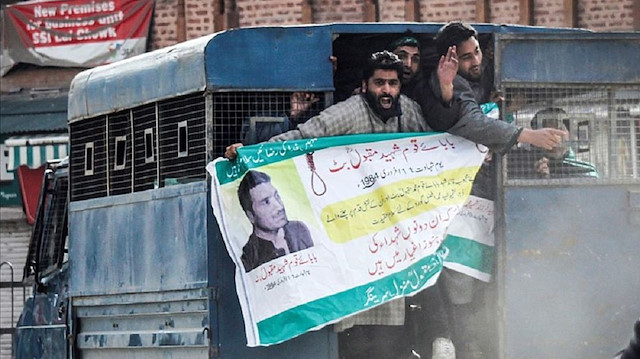
Bhat seen as pioneer of armed resistance movement was hanged in 1984, soon after an Indian diplomat was killed in London
Mobile and internet services in Indian-administered Kashmir remained suspended again on Tuesday, as the region observed the 36th death anniversary of Jammu and Kashmir Liberation Front (JKLF) founder Mohammad Maqbool Bhat, reported news agency Press Trust of India.
Security personnel had been deployed in strength in Srinagar city and elsewhere to maintain law and order, the officials said.
The JKLF was banned by India last year as part of a massive clampdown in Kashmir. Its offices were closed and main leaders, including its chairman Yasin Malik, were detained.
Bhat a native of North Kashmir village of Trehgam, is seen as the pioneer of Kashmiri’s armed resistance movement.
Noted Kashmiri journalist Zafar Meraj, who was one of the few people who knew beforehand the hanging of Bhat in 1984, recalls that he had mounted a last-ditch effort to save the guerilla leader from the gallows.
Bhat had managed to crossover the Line of Control (LoC) then knows as Ceasefire Line in the late 1950s, fought elections in Pakistan, then returned to Indian administered Kashmir. He got arrested and was sentenced to death for killing an intelligence official. He eventually escaped from a Srinagar jail.
In 1971, he was put behind bars in Pakistan for masterminding the hijacking of an Indian plane. He surfaced again in 1975 in the North Kashmir town of Handwara. He was arrested by police for his alleged role in the killing of a bank manager.
He was straight away taken to high-security Tihar jail in New Delhi, where he was hanged in 1984, apparently to assuage public anger over the abduction and killing of Indian diplomat Ravindra Mahatre in the U.K. by an alleged affiliate of Bhat’s JKLF.
Speaking to Anadolu Agency, Meraj said that he had roped in noted lawyer Muzafar Hussain Beigh, currently a senior pro-India politician to plead Bhat’s case in the Supreme Court. Beigh was recently conferred India’s third highest civilian award Padma Bhushan. But their efforts proved futile.
Like Afzal Guru, a Kashmiri whose controversial hanging for his alleged role in the attack on the Indian Parliament on Feb. 9, 2013, was widely criticized, the mortal remains of Bhat also remain buried in the premises of New Delhi’s Tihar Jail.
- Kashmir issue
Jammu and Kashmir is held by India and Pakistan in parts and claimed both in full. A small sliver of Kashmir is also held by China.
Since they were partitioned in 1947, the two countries have fought three wars -- in 1948, 1965 and 1971 -- two of them over Kashmir.
Some Kashmiri groups in Jammu and Kashmir have been fighting against Indian rule for independence, or unification with neighboring Pakistan.
According to several human rights organizations, thousands of people have reportedly been killed in the conflict in the region since 1989.


